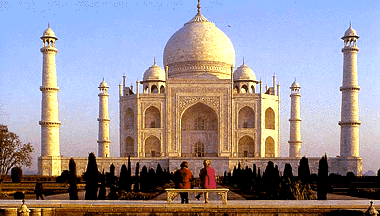

The
Taj Mahal is located at the city of Agra in the state of Uttar Pradesh,
India. It is situated on the Southwest bank of the River Yamuna and is
about 200 km south of New Delhi, which was the capital of the Mughals (Moguls),
who ruled Northern India between the 16th and 19th centuries.
The
Taj was built during the Mughal phase of Indo-Islamic style form the 16th
to the 18th century. It took 22 years and was finally completed in 1648.
It is not known for sure who planned the Taj, but the name of an Indian
architect of Persian descent, Ustad Ahmad Lahori, has been cited in many
sources. Another name that is frequntly mentioned is Isa Khan. The decorations
on the monument are said to be done by Austin of Bordeaux and Veroneo of
Venice. As
soon as contruction began, masons, craftsmen,sculptors and calligraphers
were summoned form Persia, the Ottoman Empire and Europe to work on the
masterpiece.
The
Taj Mahal is a unique combination of Persian, Central Asian and Islamic
architecture. There are four tall minarets, each 162.5 feet high, at the
corners of the structure and a majestic dome that is 58 feet in diameter.
Made entirely out of white marble, the Taj is decorated with inlaid designs
of flowers and calligraphy using precious gems such as agate and jasper.
The
architectural complex is comprised of five main elements: the Darwaza (main
gateway), the Bageecha (garden), the Masjid (mosque), the Naqqar Khana
(rest house) and the Rauza (mausoleum). Taj Mahal stands on a platform
and is reflected in a shallow pool.
It
was Shah Jehan who ordered the building of the Taj. He did it to honour
his wife, Arjumand Banu who later came to be known as Mumtaz Mahal. Mumtaz
was his second wife and over their 18 years of marriage, the had 14 children.
It was during 1630, after giving birth to their last child that she died.
Overcome by grief, Shah Jehan ordered the building of the most beutiful
mausoleum on earth in her memory.
1. Shah Jehan intended
to build a black marbled mausoleum for himself but he was imprisoned by
his son before this beautiful conception could become a reality.
2. It took 20,000 people
and a fleet of 1,000 elephants to build the Taj.
3. The colours of the
Taj are said to change at different times of the day in different
seasons. These changes supposedly simbolize the changes in a woman's moods.
4. The tombs at the Taj
are not the original tombs of Shah Jehan and his Queen. Besides this, the
Taj was only designed for one tomb; it was never intended that Shah Jehan
be buried there as well. His tomb disturbs the balance and architectural
harmony of the building.

For more info,
check out these links:
http://www.islamicity.org/Culture/Taj/default.htm
http://rubens.anu.edu.au/student.projects/tajmahal/home.html
|
|
|
|
|
|
|
|